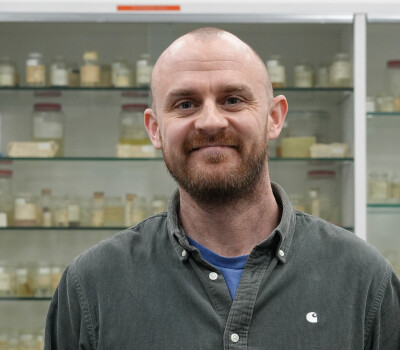Adjust your lifestyle to avoid diabetes

14 November is World Diabetes Day, a global campaign aiming to raise awareness about this chronic condition. Diabetes continues to have a big impact on global health, currently affecting 537 million adults in the world, of which 80% live in low- and middle-income countries (LMICs). Adequate education and awareness are key to preventing or delaying the onset of type 2 diabetes (T2D), the most common form of diabetes. We spoke with Diana Sagastume from ITM about her devotion to diabetes research and the importance of adhering to a healthy lifestyle.
One hundred years ago, in 1922, the first dose of insulin was successfully administered to a person living with diabetes. It was a major achievement for diabetes research and a turning point for the community. In 2006, the International Diabetes Federation established a global campaign to draw attention to the disease and provide a worldwide platform for the community to raise their voices. World Diabetes Day is held annually on the birthday of one of the co-discoverers of insulin, Sir Frederick Banting. Diabetes research and care have come a long way. Our knowledge is continuously expanding, and we dispose of effective strategies to prevent and control it.
However, access to proper and lasting treatment remains challenging to this day, particularly in constrained-resource settings. According to Diana Sagastume, research assistant in ITM’s Non-Communicable Diseases (NCDs) Unit, there is still a long way to go. “Diabetes remains a pressing public health issue of today. It has been of high importance in high-income countries (HICs) for quite some time, but we’ve seen that its incidence is increasing at a very fast rate in LMICs as well. It’s time to tackle it.”
Shifting focus to low- and middle-income settings
Diabetes, among other NCDs, is a silent threat in LMICs. Unhealthy environments have a major impact on the population’s health, and people are developing NCDs at younger ages. Many people remain undiagnosed for a prolonged period of time, implying more severe complications later in life. “There’s currently a transition happening in most LMICs that does not gain much awareness. People are starting to acquire other ways of life, eating unhealthy food and remaining sedentary. Poor quality healthcare is also a contributing factor, but the lack of information and awareness fuels the increasing incidence of T2D and gestational diabetes,” said Diana. Compared with other health threats in LMICs, diabetes is often of low priority. Scientific evidence and data remain limited in many of these settings, and few studies focus on population monitoring.
The Non-Communicable Diseases Unit of the Institute of Tropical Medicine seeks to understand NCDs such as diabetes, obesity, cardiovascular diseases, and cancers. They participate in projects and conduct research activities to gain insights into the burden of NCDs and the ways they affect populations. They are developing effective strategies to prevent their occurrence, but also seek to measure the effectiveness of current preventive strategies.
Lifestyle modifications
T2D and gestational diabetes are causally connected with poor nutrition and unhealthy lifestyles in general. However, these risk factors are largely modifiable as well. Introducing small changes to maintain optimal body weight, such as eating a healthy diet and staying physically active, has proven to be effective to prevent or delay the incidence of these types of diabetes.
The effectiveness of these lifestyle modifications has already been documented for high-income settings. In their most recent publication, the NCDs Unit sought to document whether these strategies are also effective in LMICs. By studying trials published between January 2000 and July 2022, they could confirm that lifestyle modification can decrease the incidence ratio of T2D by 25%. “The small number of studies on gestational diabetes prevented us from assessing the effectiveness of this outcome. However, these interventions bring other health advantages as well, like a reduced blood pressure and cholesterol. The proven benefits of lifestyle interventions on health enable the research community to support and establish effective prevention strategies for LMICs.”
Capacity building for first-line treatment
The NCDs Unit is also leading the currently ongoing “KIS-Antwerp” study in the Democratic Republic of the Congo, a lifestyle intervention to ultimately prevent T2D and gestational diabetes among women. They provide a comprehensive intervention, including education and motivational components, to stimulate women to acquire healthy habits and maintain optimal weight. By raising awareness about the connection between diabetes and lifestyle, they provide them with well-informed knowledge that they can put to use in first-line treatment. They also contribute to capacity building and help strengthen the expertise of healthcare workers in the country.
“Awareness of the importance of prevention is increasing at the moment, but there is still room for improvement. We have identified a gap and, based on our findings as well as other literature, we know that lifestyle modifications are of great importance for the development of diabetes. When looking at the future, it is essential to also focus on the long-term sustainability of interventions and their further implementation in the field.”
Stay up to date on the efforts, endeavours and publications of ITM’s Non-Communicable Diseases research group:
Follow them on Twitter.
Take a look at their research page.

About Diana
Diana Sagastume was born in Guatemala. She obtained her master’s degree in nutrition and health at Wageningen University (The Netherlands), specialising in nutritional physiology and health status. She did her internship within the Non-Communicable Diseases Unit of the Institute of Tropical Medicine, before joining as a full-time research assistant in 2020. She was the leading author of the unit’s latest publication on the effectiveness of lifestyle interventions on T2D and gestational diabetes, published in September 2022 in eClinicalMedicines, part of The Lancet Discovery Science. Read more about this study
Spread the word! Share this story on









